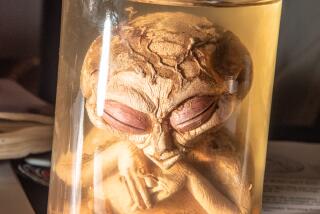Al Qaeda Expert Offers Few Details at Moussaoui Trial
- Share via
ALEXANDRIA, Va. — The man the government presented as its FBI expert on Al Qaeda admitted in federal court Tuesday that no FBI agents had alerted him before Sept. 11, 2001, that Zacarias Moussaoui had been arrested in Minnesota trying to learn to fly jumbo jets just weeks before the World Trade Center and Pentagon were attacked.
That was one of several key elements about Sept. 11 and Al Qaeda that FBI Supervisory Agent Michael Anticev said he didn’t know or was never informed about by other top law enforcement officials.
Anticev testified, for instance, that he had only heard “from the media” that suspected Sept. 11 mastermind Khalid Shaikh Mohammed was captured after the attacks, even though top government sources have trumpeted his arrest and confinement in a secret location abroad.
Asked a wide range of questions, many of them dealing with major Al Qaeda enterprises such as the attack on the U.S. destroyer Cole and a plot to blow up planes over the Pacific Ocean, Anticev often answered by saying merely, “I don’t know ... I’ve heard that ... I guess so.”
He was the government’s first witness in the federal sentencing trial of Moussaoui, a French citizen facing a possible death sentence as a Sept. 11 collaborator.
Anticev was presented to the court as one of the bureau’s top experts on Al Qaeda; he said he had honed the specialty since 1996 and eventually helped supervise other agents working on Al Qaeda squads.
His competence was challenged by defense lawyers, who argue that government mistakes prevented the discovery of the Sept. 11 plot.
He first took the stand Monday afternoon, and was questioned gingerly by Assistant U.S. Atty. David Raskin. He gave the jury a broad profile of Osama bin Laden and his Al Qaeda terrorist network, complete with documents and videotapes played in the courtroom -- much of which the public had seen on television.
But Tuesday morning, when the witness was handed over to questioning by defense attorney Edward B. MacMahon Jr., Anticev either did not know many central facts about Al Qaeda and its operatives or did not want to publicly reveal them. He sometimes responded in faltering speech.
McMahon asked Anticev about the Finsbury Park Mosque in England, a notorious meeting place for Moussaoui and other radical Muslims and a recruitment center for Al Qaeda.
“I have very limited knowledge on that,” he said.
MacMahon asked Anticev about Abu Hamza al Masri, the virulent anti-American cleric at the mosque, who long has been sought in this country on terrorism-related charges.
“I really don’t know too much about him,” Anticev said. “I know he’s a very radical fundamentalist imam who was inspiring jihad.”
On the question of Khalid Shaikh Mohammed being apprehended and said to be the Sept. 11 mastermind, an event that many Bush administration sources have described, Anticev responded: “Well, I know from the media that he is in some kind of custody.”
Moussaoui, 37, pleaded guilty last year to six charges, three of which make him eligible for the death penalty. Prosecutors contend that after his arrest in August 2001, he refused to tell the FBI about the ongoing Sept. 11 plot. Had he done so, they maintain, the government could have prevented the devastation.
But the defense is countering that the government had many clues of its own about the unfolding conspiracy. MacMahon told the jury that government foul-ups were as much to blame for the nearly 3,000 killed as was any refusal by Moussaoui to cooperate, and he sought to challenge the FBI’s competence by discrediting Anticev.
The government’s second witness, FBI Agent Jim Fitzgerald, one of two case agents on the Moussaoui case, described the work of the Sept. 11 investigation set up after the terrorist attacks.
In contrast to Anticev, Fitzgerald was crisp and sharp on the stand, speaking without notes as he led the jury through a comprehensive chronicle of the 19 hijackers’ travels to America and described them as working in pairs until their final assignments.
He also testified that they often acted in this country just as Moussaoui did.
For instance, Fitzgerald said, many set up post office boxes and e-mail accounts and took fitness training. They bought small knives and took flight lessons. They generally used their own names.
Fitzgerald also identified passports and other items belonging to the hijackers that were found at the crash sites, and he held up a long red bandanna that he said one of the terrorists wore on the flight that went down in a farm field in western Pennsylvania.
When MacMahon questioned him, Fitzgerald held up well -- though he admitted that even though Moussaoui emulated the hijackers, there was no evidence he ever met or spoke with any of the 19.
“Sir, I cannot put him with them,” Fitzgerald told the defense lawyer.
“But you tried as hard as you could, didn’t you?” MacMahon asked.
“Yes sir. We did.”
More to Read
Sign up for Essential California
The most important California stories and recommendations in your inbox every morning.
You may occasionally receive promotional content from the Los Angeles Times.











